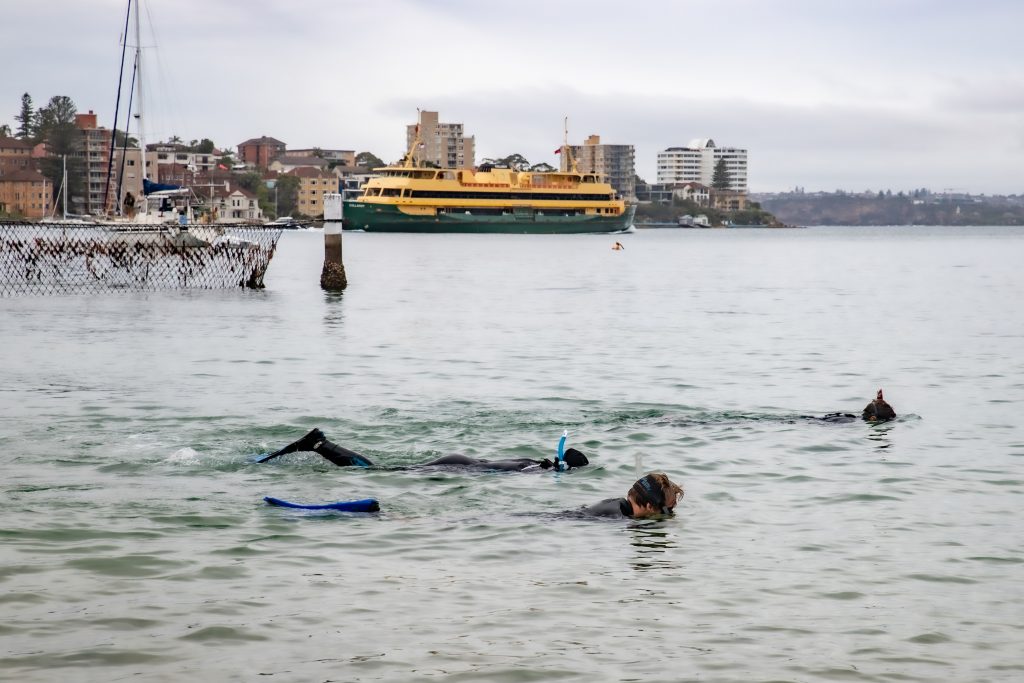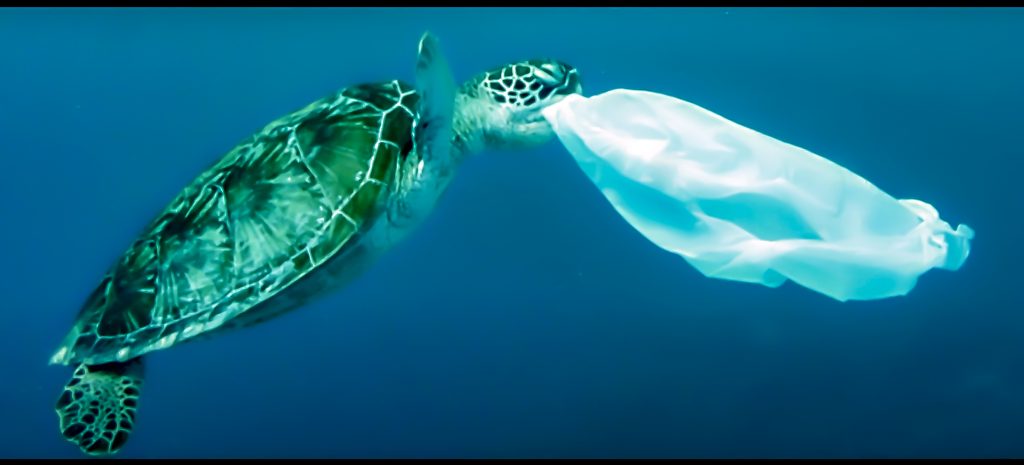Manly continues to represent the face of the plastic-free movement, as the state prepares to step up its restrictions from next week.
Members of Manly Dive snorkellers and scuba divers were joined by the NSW Environment Minister Manly MP James Griffin, yesterday, 23 October to remove plastic garbage in the waters of Manly Cove. It was part of a press conference to remind residents the ban on selling plastic straws, cutlery and cotton buds was on its way from November 1. It now looks to become national policy, too.
Northern Beaches Council has long had progressive single use plastic reduction policies, but the new state rules enables the power to ban the sale of a number of items.
However, disposable coffee cups are not included in the mandate.

The event, Dive Against Debris, which was founded by Dive Centre Manly owner Richard Nicholls, brought around a dozen volunteers to comb the seafloor for plastic litter in an effort to protect marine life. They are one of a number of groups who regularly have to remove plastic from this patch of our pin-up suburb.
“We know from Australian MicROplasic Assessment Project (AUSMAP) data that Manly Cove is among the worst beaches in the country for microplastic pollution, with research finding more than 850 pieces of microplastic per square metre.”
Mr Griffin told reporters, “In June, we banned lightweight single-use plastic bags and from 1 November we’re banning some of the most commonly littered single-use plastic items, including cutlery, plates, bowls, straws, and polystyrene food ware.
“About 95 per cent of the litter on beaches and waterways comes from suburban streets, and single-use plastic items and packaging make up two thirds of all litter in NSW.”

Mr Nicholls added his approval. “Sydney Harbour is choking on plastic so it’s absolutely fantastic that the NSW Government is banning many single-use plastics,” he said.
“Marine mammals and fish are dying through plastic ingestion and entanglement, and items are breaking down into microplastics that end up in the human food chain. It’s shocking and we have to stop it.”
Discarded fishing gear is also a significant problem, from tangled lines and reels snagged at harbourside wharves to massive nets lost at sea that ensnare whales.
The World Wildlife Fund warns, “More than 12 million tons of plastic end up in our seas every year. Plastic pollution plagues every corner of the ocean and despite growing awareness, the problem is only getting worse.
“Fishing gear accounts for roughly 10% of that debris: between 500,000 to 1 million tons of fishing gear are discarded or lost in the ocean every year. Discarded nets, lines, and ropes now make up about 46% of the Great Pacific Garbage Patch.
“This marine plastic has a name: ghost fishing gear.”

Currently there is no obligation to remove lost or discarded fishing gear in Australian waters. Fishing vessels and their proprietors are required by law to report missing nets, etc, to authorities so they can be logged as potential navigational hazards. However, nets and lobster traps can drift great distances and pose major hazards to marine wildlife, but there is little pressure to retrieve them.
Microplastics: a macro problem
After a debriefing and pairing up with ‘dive buddies’, the divers entered the ocean adjacent at West Esplanade and scouted the waters around the former Manly Sea Life Sanctuary for pieces of plastic – including food packaging, drink bottles, shopping bags, fishing gear and bottle caps – which they stowed in mesh sacks.
Plastic litter, commonly known as mismanaged plastic waste (MMPW) or macroplastics, impacts negatively on marine life in many ways. For example, turtles mistake plastic bags for jellyfish and choke on them (of the seven species of sea turtles, leatherbacks consume enormous quantities of jellyfish); sea birds starve to death when their stomachs become clogged with indigestible household items they assume are edible; plastic ring ties on six-packs of beer cans constrict seals, turtles, penguins and dolphins and strangle them or cut off the blood circulation to flippers.

However, although macroplastic waste is a major problem internationally, especially around the ocean outfalls of the ten most polluted rivers worldwide, microplastics are an increasing and deadly hazard. Mr Nicholls revealed that pollution filters on stormwater drains flowing into Sydney Harbour are catching a significant proportion of larger human litter, but microplastic is on the rise.
“Marine mammals and fish are dying through plastic ingestion and entanglement,” he said, “and items are breaking down into microplastics that end up in the human food chain. It’s shocking and we have to stop it.”

According to National Geographic, microplastics are “tiny plastic particles that result from both commercial product development and the breakdown of larger plastics.
“Officially, they are defined as plastics less than five millimetres in diameter – smaller in diameter than the standard pearl used in jewellery. There are two categories of microplastics: primary and secondary.
Primary microplastics are tiny particles designed for commercial use, such as cosmetics, as well as microfibers shed from clothing and other textiles, such as fishing nets…
“The problem with microplastics is that – like plastic items of any size – they do not readily break down into harmless molecules. Plastics can take hundreds or thousands of years to decompose – and in the meantime, wreak havoc on the environment. On beaches, microplastics are visible as tiny multicoloured plastic bits in sand. In the oceans, microplastic pollution is often consumed by marine animals.”

“We know from Australian Microplastic Assessment Project (AUSMAP) data that Manly Cove is among the worst beaches in the country for microplastic pollution,” Mr Griffin revealed, “with research finding more than 850 pieces of microplastic per square metre.
“This is exactly why we must end our reliance on single-use plastic, and why the NSW bans are critical for changing behaviour and improving the state of our environment for the benefit of biodiversity and future generations.”
Dive Against Debris
Dive Against Debris was founded in 1995 by Mr Nicholls, who established Dive Centre Manly two years earlier, a multi-award winning PADI 5-Star Instructor training facility (PADI = Professional Association of Diving Instructors).
Mr Nicholls, one of Australia’s most knowledgeable and qualified Technical Diving Instructor Trainers, was also one of the key advisers who helped establish Sydney’s only Marine Sanctuary, Cabbage Tree Bay Aquatic Reserve, in 2003.

Dive Against Debris, as well as an international underwater clean-up event, has grown into the world’s largest Citizen Science marine project.
This came about through creation of an enormous database documenting the movement and classification of marine debris, compiled by over 90,000 contributors, which is shared with research organisations, governments and local communities.
The Oxford Dictionary defines ‘Citizen Science’ as “the collection and analysis of data relating to the natural world by members of the general public, typically as part of a collaborative project with professional scientists.”
National Geographic confirms “Citizen science is the practice of public participation and collaboration in scientific research to increase scientific knowledge.”
An estimated 250,000 divers worldwide participate in Dive Against Debris events, gathering important data on the extent of plastic pollution in marine environments, which better educates authorities legislating how to minimise the problems.

The NSW Environment Protection Agency (EPA) has partnered with 17 organisations to help communities and businesses avoid single-use plastic.
Among them is Great Plastic Rescue, which “collaborate with wholesalers, distributors, retailers, businesses and not-for-profits to give clean, unused, single-use stock a new life..”
This they do by “rescuing excess stock for recycling and sustainable advanced manufacturing” – effectively repurposing single-purpose plastic items.
The NSW Department of Planning and the Environment (DPE) estimate the 1 November 2022 extension to the bans on single-use plastic items will prevent almost 2.7 billion items of plastic litter from entering the environment across NSW over the next 20 years.
Dive Against Debris
https://www.diveagainstdebris.org/
NSW Government’s single-use plastic bans extension
http://www.dpie.nsw.gov.au/plastics-ban
NSW Department of Planning and the Environment
https://www.environment.nsw.gov.au/
NSW Environment Protection Agency ‘Stop It And Swap It’ campaign
Dive Centre Manly




